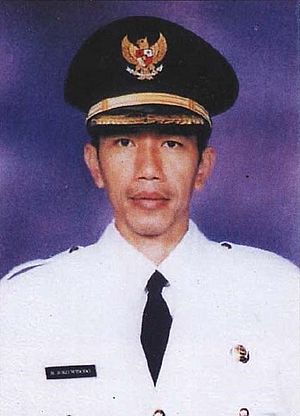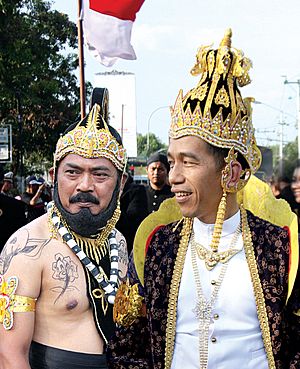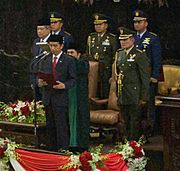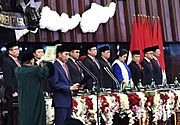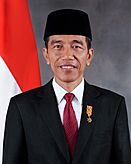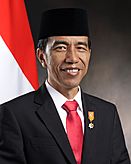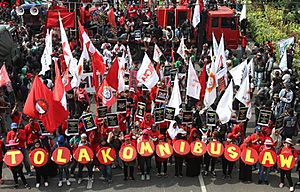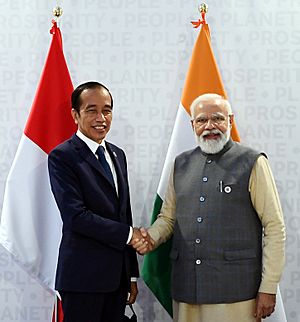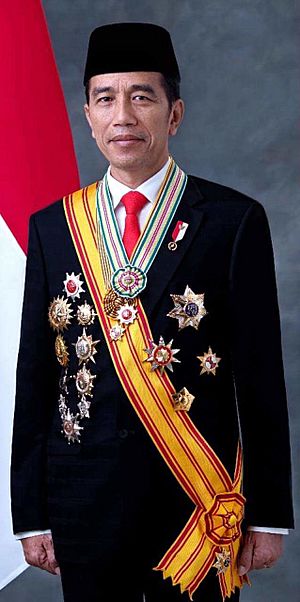Joko Widodo facts for kids
Quick facts for kids
Joko Widodo
|
|
|---|---|
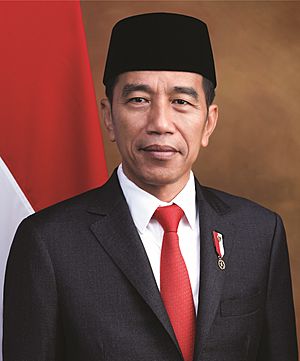
Official portrait, 2019
|
|
| 7th President of Indonesia | |
| In office 20 October 2014 – 20 October 2024 |
|
| Vice President |
|
| Preceded by | Susilo Bambang Yudhoyono |
| Succeeded by | Prabowo Subianto |
| Governor of Jakarta | |
| In office 15 October 2012 – 16 October 2014 |
|
| Vice Governor | Basuki Tjahaja Purnama |
| Preceded by |
|
| Succeeded by | Basuki Tjahaja Purnama |
| Mayor of Surakarta | |
| In office 28 July 2005 – 1 October 2012 |
|
| Vice Mayor | F. X. Hadi Rudyatmo |
| Preceded by | Slamet Suryanto |
| Succeeded by | F. X. Hadi Rudyatmo |
| Personal details | |
| Born | Mulyono 21 June 1961 Surakarta, Indonesia |
| Political party | Independent |
| Other political affiliations |
PDI-P (2004–2024) |
| Spouse | |
| Children |
|
| Parents |
|
| Relatives | Family of Joko Widodo |
| Alma mater | Gadjah Mada University (Ir.) |
| Occupation |
|
| Signature | |
| Nickname | Jokowi |
Joko Widodo ( born Mulyono; 21 June 1961), popularly known as Jokowi, is an Indonesian politician and businessman who served as the seventh president of Indonesia from 2014 to 2024. Previously a member of the Indonesian Democratic Party of Struggle (PDI-P), he was the country's first president to not emerge from the country's political or military elite. He previously served as governor of Jakarta from 2012 to 2014 and mayor of Surakarta from 2005 to 2012.
Contents
Early life and business career
Jokowi was born on 21 June 1961. He was raised in a riverside slum in Surakarta, which greatly affected him. Later he organized low income housing in Surakarta during his years as mayor of that city. Jokowi was often sick as a toddler, and his name was thus changed—a common practice in Javanese culture—to Joko Widodo, with widodo meaning "healthy" in Javanese. At the age of 12, he started working in his father's furniture workshop.
He graduated from Gadjah Mada University in 1985, and married his wife, Iriana, a year later. He worked as a carpenter and a furniture exporter before deciding to become a politician.
Political career
Jokowi was elected mayor of Surakarta in 2005. He achieved national prominence as mayor and was elected governor of Jakarta in 2012, with Basuki Tjahaja Purnama as his deputy. As governor, he reinvigorated local politics, introduced publicised blusukan visits (unannounced spot checks) and improved the city's bureaucracy, reducing corruption in the process. He also introduced years-late programs to improve quality of life, including universal healthcare, dredged the city's main river to reduce flooding, and inaugurated the construction of the city's subway system.
In 2014, he was nominated as the PDI-P's candidate in that year's presidential election, choosing Jusuf Kalla as his running mate. Jokowi was elected over his opponent Prabowo Subianto, who disputed the outcome of the election, and was inaugurated on 20 October 2014.
Presidency (2014–2024)
Once in office, Jokowi focused on economic growth and infrastructure development as well as an ambitious health and education agenda. On foreign policy, his administration emphasised "protecting Indonesia's sovereignty", with the sinking of illegal foreign fishing vessels. He was re-elected in 2019 for a second five-year term, again defeating Prabowo Subianto.
Economy
Before taking office, Jokowi sought for outgoing president Susilo Bambang Yudhoyono (SBY) to take responsibility for the decision to further increase fuel prices by further removing subsidies. Previous attempts by SBY to do so had resulted in civil unrest. On 1 January 2015, Jokowi took measures that, on the surface, appeared to reduce fuel subsidies. The policy stirred up some demonstrations, with Jokowi citing it as necessary to increase funding for the infrastructure, education and health sectors. However, since March 2015, the government has set the price of Premium-branded petrol far below the market price, causing the fuel subsidy to be incurred by state-owned oil company Pertamina instead of the direct government account. Additionally, the government also implemented a single-price program, aiming to sell fuel through official channels at the same price nationally, including in isolated parts of Kalimantan and Papua. The government claimed that this was achieved in 2017.
In the first quarter of 2015, year-on-year GDP grew 4.92%, and in the second quarter, it grew 4.6%, the lowest figure since 2009. The Indonesian rupiah (IDR) also weakened throughout Jokowi's administration, with its exchange rate per US dollar briefly passing IDR 15,000 in 2018, the lowest level since the 1997 Asian financial crisis, and sank lower to 16,700 in 2020. The year-on-year inflation in June 2015 was 7.26%, higher than in May (7.15%) and June the year before (6.7%).
Jokowi's administration continued the resource nationalism policy of its predecessor, nationalising some assets controlled by multinational companies such as Freeport McMoRan, TotalEnergies and Chevron. In 2018, in a move aimed to cut imports, oil companies operating in Indonesia were ordered to sell their crude oil to state-owned Pertamina. A ban was also enforced on the exports of raw nickel ore, intended to help promote the development of local nickel-related industries such as smelters and battery factories. The policy was further extended, with export bans of unprocessed copper, tin, bauxite and gold ores expected to come into force in mid 2023.
Infrastructure development was a significant feature of the Jokowi administration, focusing on road and railway expansion, seaports and airports development, and irrigation. In 2016, the state budget allocated Rp 290 trillion (US$22 billion) for infrastructure, the biggest in Indonesian history. In total, his administration planned 265 infrastructure projects starting in 2016. In September 2015, Indonesia awarded a $5.5 billion high-speed rail project to China, to Japan's disappointment, which is also vying for the project. Indonesia's transportation ministry laid out a litany of shortcomings in plans for the project, casting doubt on the project and spotlighting Jokowi's limits in turning mega-projects into reality as he tries to draw foreign investors. Other significant projects include the completion of the 4,325-kilometer Trans Papua road and the Trans-Java Toll Road, initial construction of the Trans-Sulawesi Railway and the Trans-Sumatra Toll Road, a US$50 billion plan to develop the maritime sector including 24 "strategic ports", and expansion of airport capacity in remote areas. The ports' development and modernisation program, dubbed the "Sea Toll Road" program, was aimed to reduce price inequality between the better developed western parts of the country and the less populated eastern parts.
In addition to the major projects, the Jokowi administration also implemented a village fund program in which villages across the country received funding to allocate on basic infrastructures such as roads and water supply, tourism development and village enterprises to improve rural economies. The initial campaign promise was that IDR 1.4 billion (around US$100,000) would be allocated for every village annually, though as of 2019, less than a billion was allocated. Between 2015 and 2018, IDR 187 trillion (US$14 billion) had been reallocated through the program. The administration has targeted to streamline land certification across the country, aiming to distribute certificates of land ownership across the country completely. It involved increasing the issuing rate of certificates from around 500,000 to several million annually. In 2016, the administration signed into law a tax amnesty bill following a lengthy public debate and push back, giving wealthy Indonesians a chance to declare their unreported assets before the government would strengthen rules and oversight around imports and exports. It became the most successful program of its kind in history, with over IDR 4,865 trillion (approximately US$366 billion) of previously unreported assets declared to the tax office.
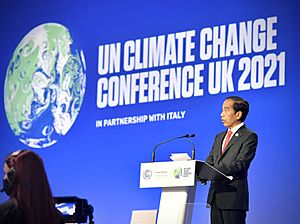
The opposition criticised the aggressive spending on infrastructure as it increased Indonesia's national debt by 48% between 2014 and March 2018 to US$181 billion. They also pointed out that most of the debt was allocated for remunerations rather than infrastructure development. In April 2018, Jokowi also issued a new policy that allows foreign workers in Indonesia without Indonesian language skills requirement, reasoning that it would increase investments. The policy faced significant opposition from local labour unions, who claimed that the policy would increase unemployment rates.
In 2020, the DPR passed the Omnibus Law on Job Creation. Though intended to boost investment and reduce red tape, it is also perceived as weakening labour and environmental protections, causing a series of protests in major cities. Jokowi defended the law by saying that it would be needed to create jobs and called for protesters to lodge a challenge instead to the Constitutional Court of Indonesia. The law, which revised over 70 previous laws and contained some 1,200 clauses, had been put forward by Jokowi following his 2019 re-election. Several groups had criticised the opaqueness of the government during the deliberation of the law. In the same year, Indonesia hit the lowest inflation level in history and faced the first economic recession since the 1997 Asian Financial crisis.
In November 2021, Jokowi promised to end and reverse deforestation in Indonesia by 2030, in the COP26 climate summit's first major agreement.
The European Commission officially approved a measure to phase out palm oil-based biofuels by 2030. During a meeting with European Commission President Ursula von der Leyen, Widodo expressed concern about the EU Deforestation Regulation (EUDR), which aims to prevent products linked to deforestation from reaching the EU market.
Politics
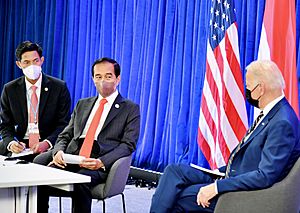
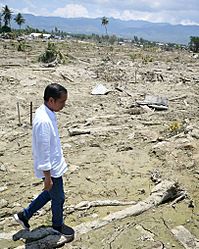
Early in his first term, the opposition coalition within the DPR attempted to revoke a regulation (Perppu, Government Regulation in Lieu of Acts) issued by Jokowi's predecessor, which had guaranteed the holding of direct regional elections in Indonesia (and overrode a legislator-issued bill which arranged for indirect elections). Jokowi supported the direct regional elections and opposed attempts to revoke the regulation, stating that "direct regional elections was, in principle, non-negotiable". Within the first three years of his administration, Jokowi issued four such Perppu. Jokowi's government, including parties which opposed him during presidential elections, have been described as a big tent government, and by former Singaporean foreign minister George Yeo as "democracy with Javanese characteristics".
Following his reelection in 2019, a number of prominent politicians began floating the idea of amending the constitution to permit Jokowi to run for a third term in 2024. Key cabinet members voicing their support for a term limit extension included Coordinating Ministers Airlangga Hartarto and Luhut Binsar Pandjaitan. The proposal became more prominent following the COVID-19 pandemic, due to disruptions to government programs in his second term. By April 2022, Jokowi explicitly announced that he would not be seeking a third term, and ordered his cabinet to refrain from publicly speaking about a term limit extension or an election delay.
Jokowi's second term ended on 20 October 2024, and he was succeeded by Prabowo Subianto with Jokowi's eldest son becoming vice president.
Law and human rights
Regarding terrorism, Jokowi's administration in early 2016 proposed replacing the 2003 anti-terrorism law. Following the 2018 Surabaya bombings, the worst terrorist attack on Indonesian soil since the 2002 Bali bombings, the controversial bill passed, allowing the Indonesian National Armed Forces to participate in counter-terrorism activities upon police request and presidential approval. It also allowed extended detention of terror suspects and permitted wiretapping without initial court approval. Jokowi had threatened to issue a presidential regulation in lieu of law (perppu) if the bill did not pass the parliament by June that year.
During Jokowi's administration, there were numerous instances where people had been arrested or reported to police for activities deemed insulting to the president.
A premium price hike of public health care BPJS Kesehatan through Executive Order (Perpres) 64/2020 was criticised as a flagrant breach of permanent Supreme Court (Mahkamah Agung) decision that nullified the Perpres 82/2018 about the price hike. The Perpres 64/2020 itself was signed amid the COVID-19 pandemic that had caused hardship among the population. His former deputy mayor of Surakarta, F. X. Hadi Rudyatmo, also voiced similar concerns.
Foreign policy
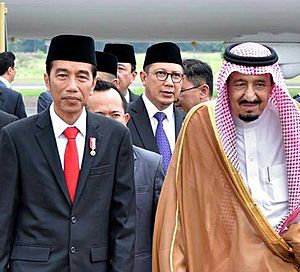
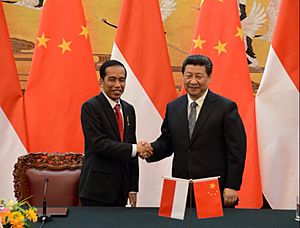
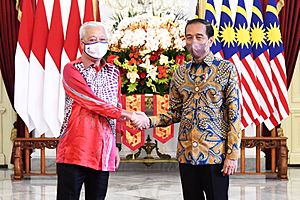
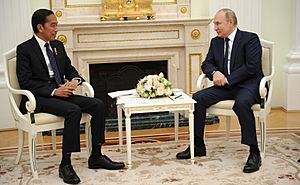
Before Jokowi's election, Indonesia's foreign policy under former president SBY was moulded by the mission statement, "A thousand friends and zero enemies". Jokowi mandated a three-pronged policy of maintaining Indonesia's sovereignty, enhancing the protection of Indonesian citizens, and intensifying economic diplomacy.
Jokowi aspired Indonesia to become a global maritime power (Indonesian: poros maritim dunia or global maritime axis). He believed Indonesia should assert itself as a force between the two oceans: the Indian Ocean and the Pacific Ocean. The five pillars of this maritime-axis doctrine were rebuilding Indonesia's maritime culture, maintaining and managing marine resources, developing maritime infrastructure and connectivity as well as developing the shipping industry and maritime tourism, inviting other nations to cooperate in the marine field and eliminate the source of conflicts at sea, and developing maritime defence forces. As part of this vision, Jokowi adopted a tougher stance on illegal fishing. He stated that Jakarta could no longer tolerate a situation where over 5,000 ships are operating illegally in its waters every day, making a mockery out of Indonesian sovereignty and resulting in annual losses of over $20 billion.
On the territorial disputes in the South China Sea, particularly in the Natuna Islands where China's nine-dash line intercepts Indonesian EEZ claims, Jokowi stated that "there will be no compromise on sovereignty", and renamed Indonesia's section of the waters in the South China Sea as "North Natuna Sea". In June 2016, he held a cabinet meeting off the islands aboard the Indonesian Navy corvette KRI Imam Bonjol, calling to step up maritime patrols in the area. Under his administration, Indonesia released an "Indo-Pacific Vision" for ASEAN countries, which calls for regional architecture and considers the Indian and Pacific Oceans as a single interconnected geostrategic area. Indonesia also entered a trilateral cooperation agreement with Malaysia and the Philippines, allowing coordinated patrols in the pirate-infested Sulu Sea.
In the Muslim world, Jokowi released a statement calling for the Muslim leaders at the Organisation of Islamic Cooperation summit meeting in Jakarta to unite in reconciliation and push for Palestinian independence. Under Jokowi, Indonesia's Foreign Minister has visited Palestine but refused entreaties to establish bilateral diplomatic relations with Israel. An honorary consul was established in Ramallah in the West Bank though it had to be inaugurated in Amman, Jordan. Jokowi also condemned the persecution of Rohingya Muslims in Myanmar and oversaw the departure of four Indonesian Air Force transport planes with 34 tons of relief supplies for Rohingya refugees in Bangladesh. In October 2021, Jokowi advocated COVID-19 vaccine equity, urging richer countries to share their vaccines with poorer ones.
Capital relocation
By April 2019, it was made public that Jokowi had decided in a meeting with cabinet ministers to move the capital of Indonesia away from Jakarta to a location outside Java. On 25 August 2019, it was further announced that the new capital would be located in Kalimantan, between the regencies of North Penajam Paser and Kutai Kartanegara.
Jokowi Effect
The Jokowi Effect (Indonesian: Efek Jokowi) is a term coined to describe the influence of media popularity of Jokowi on Indonesian politics and the Indonesian economy. When Jokowi was declared as a presidential candidate in the 2014 Indonesian presidential election it is believed that the popularity of the Indonesian Democratic Party – Struggle was boosted to 30% in the 2014 Indonesian legislative election. Meanwhile, in the capital market, the effect is said to have stimulated the Indonesian stock market and Rupiah, because Jokowi was regarded as having a clean track record.
Family and personal life
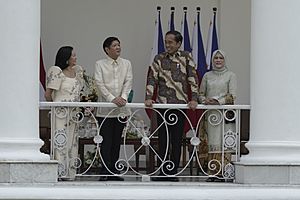
Jokowi married his wife Iriana in 1986. The couple has two sons and one daughter. Their first son, Gibran Rakabuming Raka (born 1 October 1987), studied abroad in Sydney and Singapore (at the Management Development Institute of Singapore, MDIS) and currently runs a catering and wedding-planning business in Surakarta. Their only daughter, Kahiyang Ayu (born 20 April 1991), completed an undergraduate degree in food technology at the state-owned Sebelas Maret University in Surakarta. Their second son, Kaesang Pangarep (born 25 December 1994), completed his high school years in ACS International, Singapore, and is an online vlogger. Jokowi has five grandchildren: a grandson and a granddaughter from Gibran (born in 2016 and 2019 respectively) and a granddaughter and two grandsons from Kahiyang (born in 2018, 2020 and 2022 respectively).
Several members of Jokowi's family have declared their intentions to enter politics by running as candidates in 2020 local elections. Gibran has declared his candidacy for the mayorship of Surakarta, in addition to his son-in-law Bobby Nasution (Medan) and brother-in-law Wahyu Purwanto (Gunung Kidul Regency). Gibran and Bobby won their elections, and both took office in 2021. Jokowi's younger sister Idayati married Anwar Usman, Chief Justice of the Constitutional Court of Indonesia, in May 2022.
Jokowi has been described as "Muslim but broadly secular in his outlook". His statement in 2019 that religion and politics should be separated prompted a public debate on whether he was promoting secularism in the country. In June 2013, a film titled Jokowi, depicting Jokowi's childhood and youth, was released. He expressed some objections to the film, saying that he felt his life had been a simple one and was not worthy of being adapted into a film.
According to The Economist, Jokowi "has a penchant for loud rock music" and owned a bass guitar signed by Robert Trujillo of heavy metal band Metallica which was confiscated by the KPK. In November 2017, Danish Prime Minister Lars Løkke Rasmussen, who was on an official visit to Jakarta, gave Jokowi a Metallica Master of Puppets vinyl box set as a diplomatic gift. It was signed by the band's drummer and co-founder, Lars Ulrich, a Danish native. Under his policy of transparency, Jokowi paid IDR 11 million ($800) out of his personal funds to claim the record, which had been declared a state asset to avoid accusations of gratification. He is also a fan of other metal bands including Lamb of God, Carcass and Napalm Death. On 2 November 2013, while he was the Governor of Jakarta, he was seen in the rock festival Rock in Solo in casual dress.
He has also been noted by many to be very similar in appearance to former US president Barack Obama; his outsider political profile also inspired comparisons to Obama.
Awards and honours
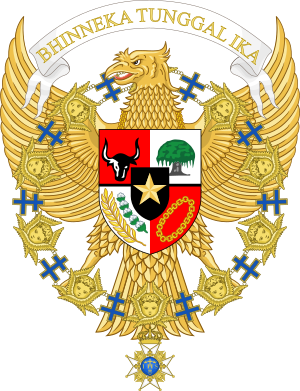
National honours
 Star of the Republic of Indonesia, 1st Class – 2014
Star of the Republic of Indonesia, 1st Class – 2014 Star of Mahaputera, 1st Class – 2014
Star of Mahaputera, 1st Class – 2014 Star of Merit, 1st Class – 2011
Star of Merit, 1st Class – 2011 Star of Humanity – 2014
Star of Humanity – 2014 Star of Democracy Upholder, 1st Class – 2014
Star of Democracy Upholder, 1st Class – 2014 Star of Budaya Parama Dharma – 2014
Star of Budaya Parama Dharma – 2014 Star of Bhayangkara, 1st Class – 2014
Star of Bhayangkara, 1st Class – 2014 Guerilla Star – 2014
Guerilla Star – 2014 Sacred Star – 2014
Sacred Star – 2014 Star of Dharma – 2014
Star of Dharma – 2014 Star of Yudha Dharma, 1st Class – 2014
Star of Yudha Dharma, 1st Class – 2014 Star of Kartika Eka Paksi, 1st Class – 2014
Star of Kartika Eka Paksi, 1st Class – 2014 Star of Jalasena, 1st Class – 2014
Star of Jalasena, 1st Class – 2014 Star of Swa Bhuwana Paksa, 1st Class – 2014
Star of Swa Bhuwana Paksa, 1st Class – 2014
Foreign honours
 The Most Esteemed Family Order of Brunei (DK) – 7 February 2015
The Most Esteemed Family Order of Brunei (DK) – 7 February 2015 Sultan of Brunei Golden Jubilee Medal – 6 October 2017
Sultan of Brunei Golden Jubilee Medal – 6 October 2017
 Knight of the Royal Order of the Seraphim – 22 May 2017
Knight of the Royal Order of the Seraphim – 22 May 2017
See also
 In Spanish: Joko Widodo para niños
In Spanish: Joko Widodo para niños


